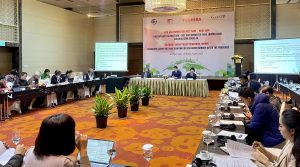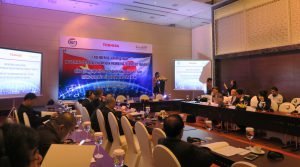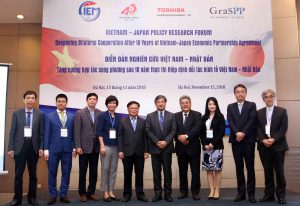概要報告
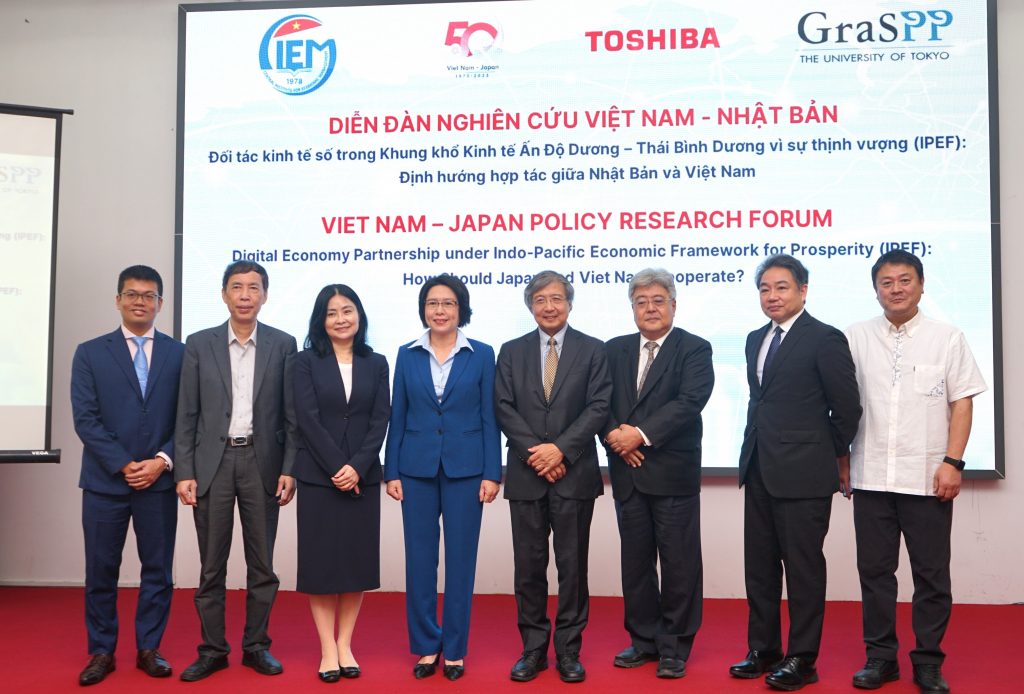
Since 2015, GraSPP has been collaborating with Viet Nam’s Central Institute for Economic Management (CIEM) under the Ministry of Planning and Investment to enhance intellectual exchange between Japan and Viet Nam, with the financial support of the Toshiba International Foundation (TIFO). This article summarizes the discussions at the workshop late last year.
On December 5, 2023, GraSPP and CIEM hosted the Viet Nam-Japan Policy Research Forum workshop 2023 – Part 2, titled “Digital Economy Partnership under Indo-Pacific Economic Framework for Prosperity (IPEF): How Should Japan and Viet Nam Cooperate?”
The workshop at CIEM’s Conference Hall in Hanoi, certified as a program to celebrate the 50th anniversary of establishing diplomatic relations between Japan and Viet Nam, attracted more than 60 participants from government agencies, academic institutions, business entities, professional associations, bilateral and international organizations, and the media, including The Japanese Chamber of Commerce and Industry in Vietnam (JCCI), Japan International Cooperation Agency (JICA) Viet Nam Office, and the Australian Embassy Vietnam.
The workshop convened with the attendance of Dr. Tran Thi Hong Minh, President of CIEM, Mr. Kazuo Kusakabe, Chief Representative of Toshiba Asia Pacific Pte. Ltd., Prof. Toshiro Nishizawa, GraSPP, and distinguished speakers and commentators. The speakers and commentators were Prof. Takashi Terada, Doshisha University’s Faculty of Law, Dr. Vo Tri Thanh, President of the Institute for Brand and Competitiveness Strategy and former Vice President of CIEM, Prof. Mie Oba, Kanagawa University’s Faculty of Law, and Mr. Nguyen Anh Duong, Director of CIEM’s Department for General Economic Issues and Integration Studies. Prof. Jun Hanna, Ritsumeikan University’s College of International Relations, also participated in the discussion.
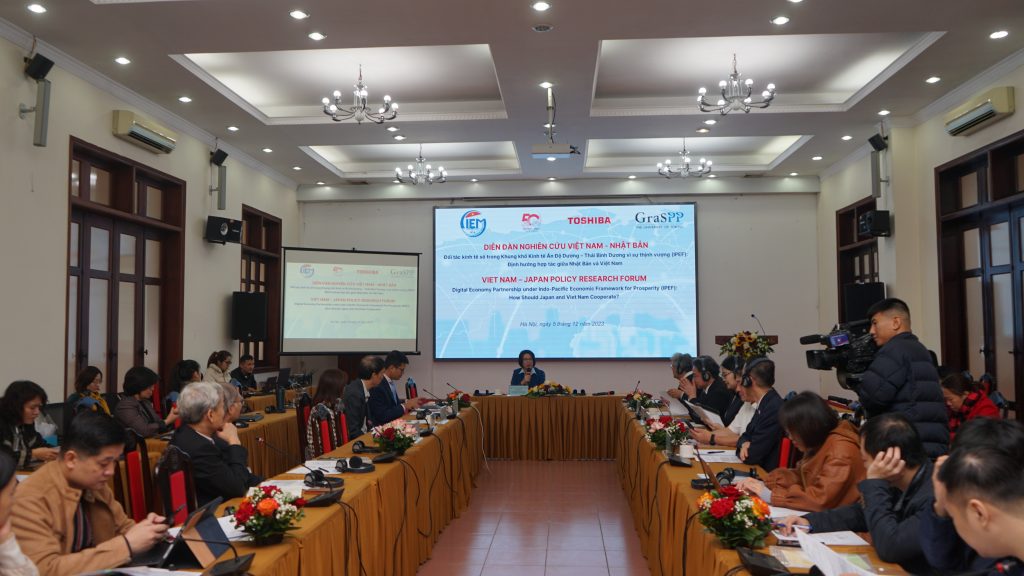
Background
Following the US withdrawal from the Trans-Pacific Partnership (TPP) in 2017, the remaining members worked under Japan’s coordination to establish the Comprehensive and Progressive Agreement for Trans-Pacific Partnership (CPTPP), which entered into force in 2018. The IPEF, launched in May 2022, is another critical initiative with Japan and Viet Nam as members and could serve as a platform for more open and rigorous discussion on new standards of economic cooperation in the Indo-Pacific region. IPEF could offer an opportunity for participating countries to jointly develop new trade- and development-related standards. The digital economy partnership is among the few common areas members have agreed upon.
The workshop provided a platform for sharing experiences and perspectives on Japan-Viet Nam cooperation to create new standards of economic cooperation in the Indo-Pacific region. A summary of the workshop discussion was shared with policymakers in Viet Nam.
The event was the ninth international workshop GraSPP and CIEM had jointly hosted since 2015.
Opening session
Dr. Tran Thi Hong Minh declared the workshop’s opening and emphasized the importance of digital platforms for production and business. She illustrated that digital economy partnerships had also become a feature of international cooperation, with particular attention given to the Singapore-Australia Digital Economy Agreement and the Digital Economy Partnership Agreement between Singapore, New Zealand, and Chile. She continued that Viet Nam was making significant efforts to promote the development of the digital economy as part of its growth paradigm shift toward innovation and increased labor productivity.
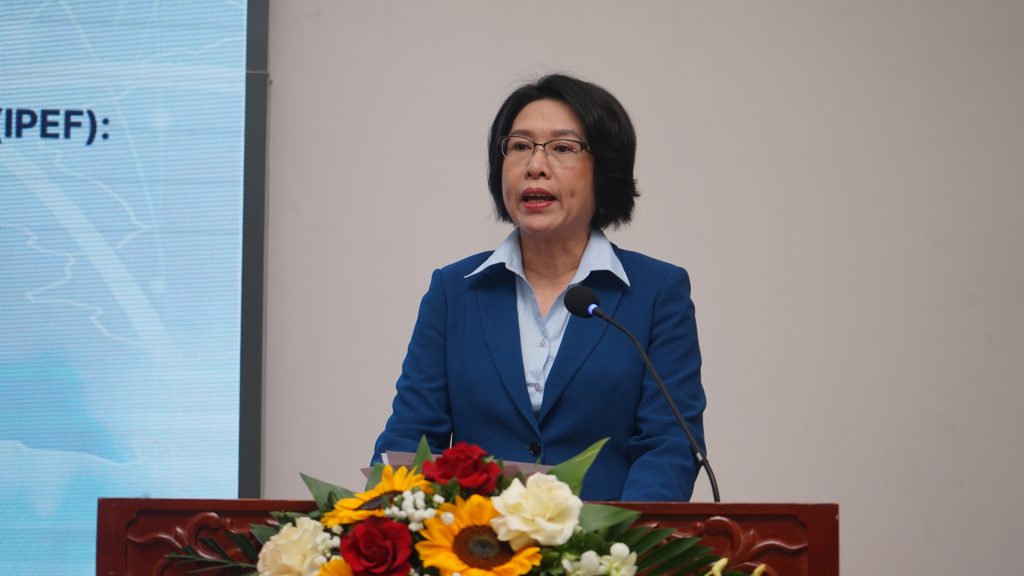
Dr. Tran added that the country had taken necessary steps, such as promulgating the Law on Electronic Transactions (amended) and approving several decisions, including the national digital transformation program, the e-government development strategy, and the project to promote digital transformation and information technology applications in trade promotion activities. She characterized these policies and roadmaps as a direction toward integrating policy mindsets and solutions for enabling digital transformation.
Dr. Tran stressed that Viet Nam had changed its approach toward digital economic partnerships and that the digital economy cooperation discussed at IPEF presented an opportunity for Viet Nam to refine its policy and legal framework in line with international best practices to enhance its capacity for digital economy development.
Dr. Tran noted that Japan and Viet Nam had long been committed to promoting bilateral relations and recently established the Comprehensive Strategic Partnership for Peace and Prosperity in Asia and the World. She stressed that the two countries supported each other in various fields at international forums and that it was essential to concretize collaboration related to the digital economy in general and within the IPEF framework.
Dr. Tran’s opening remarks concluded with an appreciation for TIFO’s financial support and GraSPP’s cooperation in organizing the annual Viet Nam-Japan Policy Research Forum workshop.
Mr. Kazuo Kusakabe drew attention to the significance of the second workshop in 2023 under the Viet Nam-Japan Policy Research Forum to commemorate the 50th anniversary of establishing diplomatic relations between Viet Nam and Japan. He underscored Toshiba’s presence in Viet Nam in six diverse businesses and one office, each representing different fields. Mr. Kusakabe highlighted Toshiba’s role as the leading brand in the energy sector, contributing significantly to Viet Nam’s energy supply. Additionally, he illustrated Toshiba’s role in protecting the environment by producing electric motors for the global market and providing clean water through its wastewater treatment technologies. Mr. Kusakabe emphasized the importance of continuously fostering cooperation between Japan and Viet Nam.
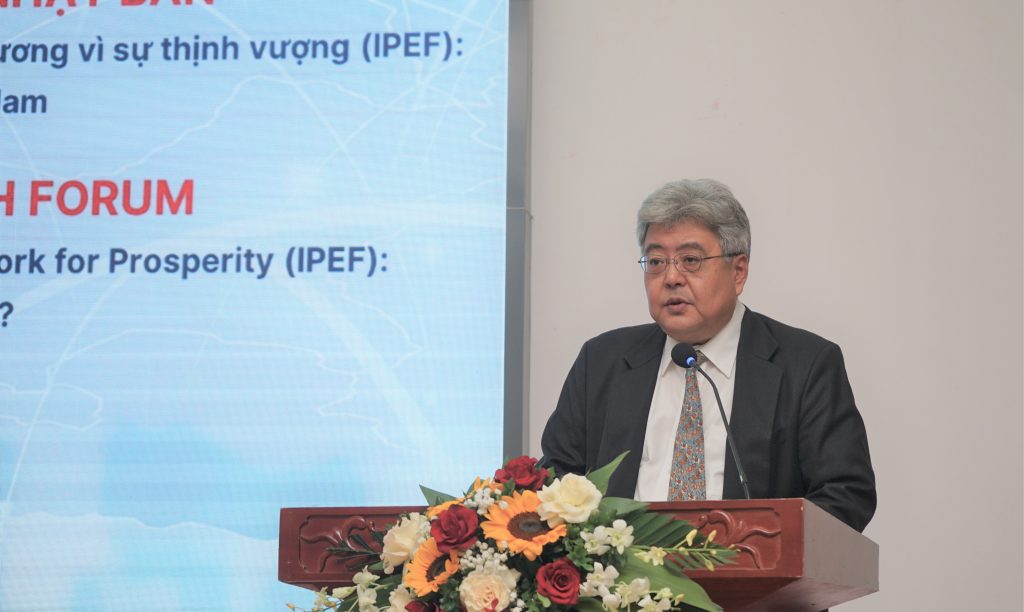
Prof. Toshiro Nishizawa highlighted the solid and continuous bilateral cooperation between Viet Nam and Japan and the longstanding partnership between CIEM and GraSPP, which owed its success to the unwavering commitment of all stakeholders and the TIFO’s financial support since 2015. He stressed the timeliness of the workshop to explore opportunities for a digital economy partnership between Japan and Viet Nam, especially in the context of IPEF. With IPEF encountering geopolitical uncertainties, Prof. Nishizawa added that it was a positive sign that Japan and Viet Nam had established the Comprehensive Strategic Partnership for Peace and Prosperity in Asia and the World. He encouraged all the participants to discuss candidly how to promote Japan-Viet Nam collaboration for a joint digital economy partnership at this critical juncture.
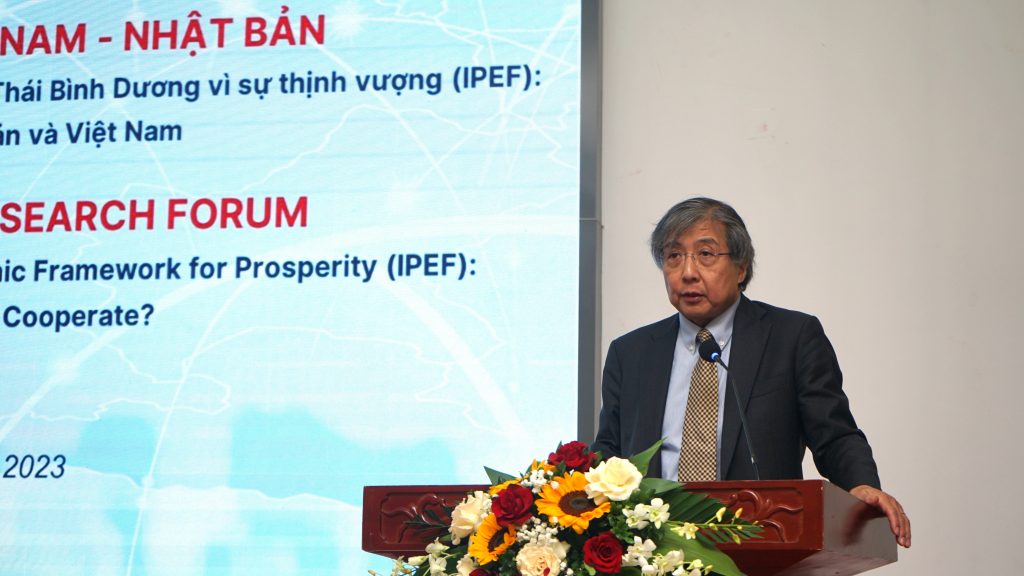
Session 1. Status of Japan-Viet Nam collaboration in the rapidly evolving Indo-Pacific context
Speakers
Dr. Vo Tri Thanh, President, Brand and Competitiveness Strategy Institute; former Vice President of CIEM
Prof. Mie Oba, Faculty of Law, Kanagawa University
Commentator
Prof. Toshiro Nishizawa, GraSPP, The University of Tokyo
Moderator
Dr. Tran Thi Hong Minh, President, CIEM
Dr. Vo Tri Thanh proposed to explore the potential of connecting the Asia Pacific and Indian Ocean regions, an initiative established originally through the Asia-Pacific Economic Cooperation (APEC) focusing on trade and investment liberalization. Dr. Vo‘s idea was to expand the initiative further and create concentric cooperation circles, such as ASEAN+1, CPTPP, and the Regional Comprehensive Economic Partnership Agreement (RCEP). He further explained that there had been a longstanding discussion about India’s role in those efforts, particularly in the context of the Indo-Pacific narrative. Dr. Vo considered the 14-member IPEF a significant opportunity to drive sustainable and inclusive development and emphasized the importance of trade, supply chain, clean economy, and fair economy toward global growth and prosperity.
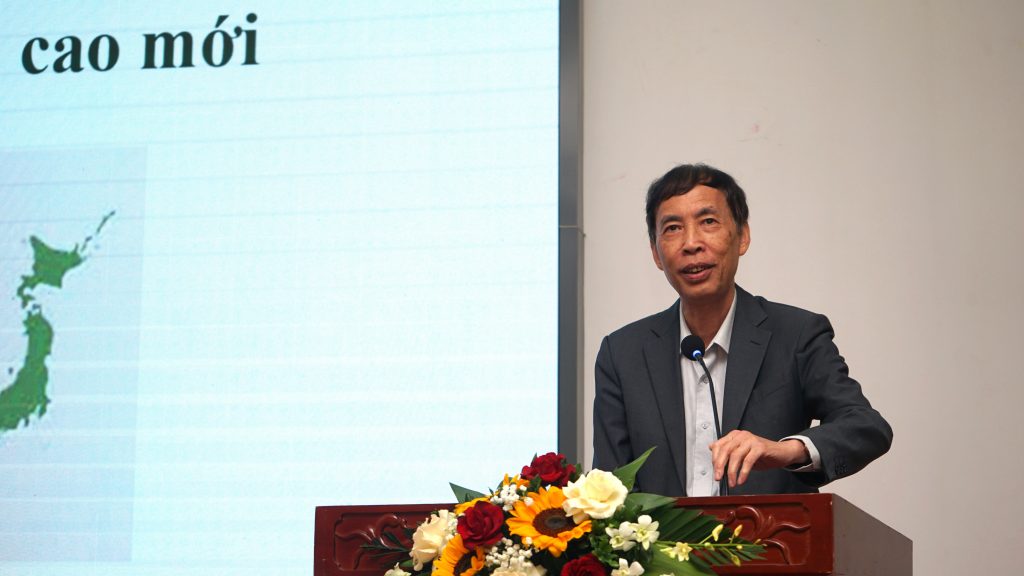
Dr. Vo shared his views that, while China and India’s rise had altered global power dynamics, it was encouraging to see both the United States and China commit to responsible competition. He also described it as encouraging that the relationship between Viet Nam and Japan was strong and mutually beneficial, with many Vietnamese working in Japan, Japanese experts living in Viet Nam, and nationals from both sides sharing ambitious goals and aspirations. He highlighted that Japan had significantly supported Viet Nam’s industrialization and modernization process. At the same time, he added, Viet Nam possessed unique strengths in the pharmaceuticals, semiconductors, and medical equipment industries and was working to develop further through strategic investments in human resources and core technologies. Dr. Vo concluded that such collaborations would contribute to a more peaceful, prosperous, and interconnected world.
Prof. Mie Oba made a presentation about advancing institutionalization in Asia amid the turmoil of regional order, with a specific starting point to consider being cooperation on the digital economy. Prof. Oba discussed the existing liberal international order (LIO) as characterized by liberal internationalism, liberal values and norms, and free and open economic order. However, she argued that the three-pillar LIO faced several challenges, including the emergence of China as a global power, a decline in the US hegemonic power, and the adverse effects of globalization on issues such as the environment.
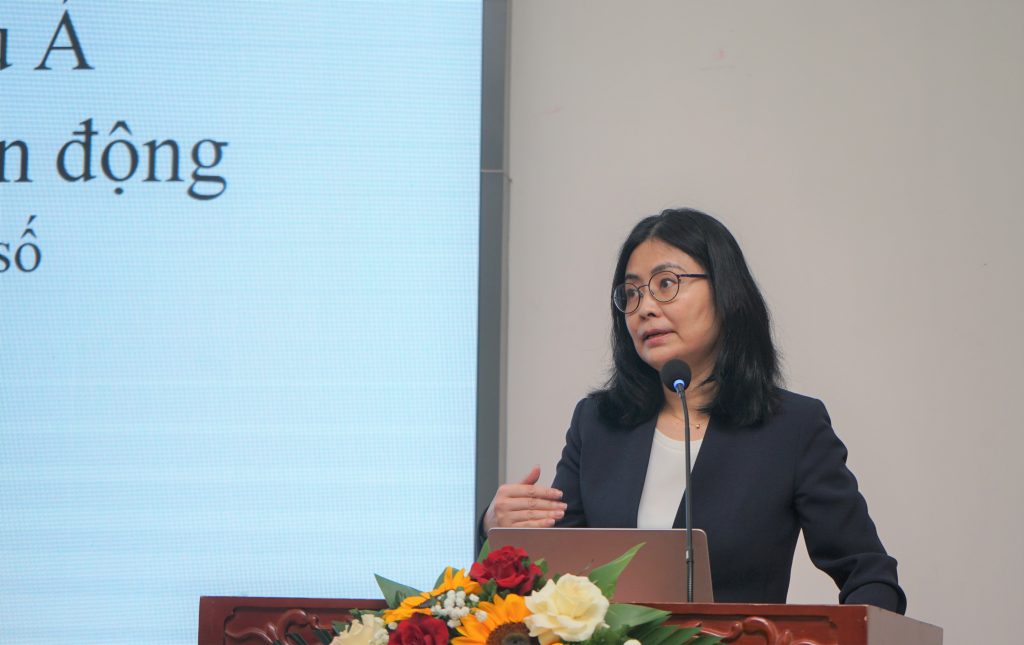
Prof. Oba considered digital transformation essential in advancing inclusive digital trade and reducing transaction costs to facilitate market access. She stressed that the pace of digital transformation in Japanese society should be faster because the digital economy was now part of the first pillar of the Digital Economy Policy Platform (DEPP), which aimed to advance inclusive digital trade by building trust and confidence in the digital economy, enhancing access to online information and internet use, facilitating digital trade, and addressing discriminatory practices.
Prof. Oba mentioned that the IPEF negotiations had faced such challenges as the lack of enthusiasm from the Biden administration and a market access element and suggested watching whether the next administration would continue the talks. She concluded by pointing out several questions surrounding the IPEF’s potential to become a framework for digital cooperation, asking how trade issues under IPEF could be harmonized with other frameworks without solid political commitment, and highlighting the importance of engaging in constructive dialogue and working towards a mutually beneficial solution.
Prof. Toshiro Nishizawa agreed with both speakers and shared his thoughts about the issues discussed. He noted that Dr. Vo compared several initiatives, such as the Pacific Trade and Development Conference (PAFTAD), Pacific Economic Cooperation Council (PECC), APEC, and Indo-Pacific approaches, and assessed the evolution of many industries might have been a “natural” process aligned with the principle of “open regionalism,” except for IPEF. Prof. Nishizawa argued that IPEF was an alternative to CPTPP for the US and geopolitically motivated with a feature of closed regionalism to counter China’s presence. Prof. Nishizawa asked Dr. Vo whether IPEF was attractive enough for its member states compared with CPTPP or RCEP and whether the bilateral cooperation between Japan and Viet Nam was a more practical option for developing a digital economy than under IPEF.
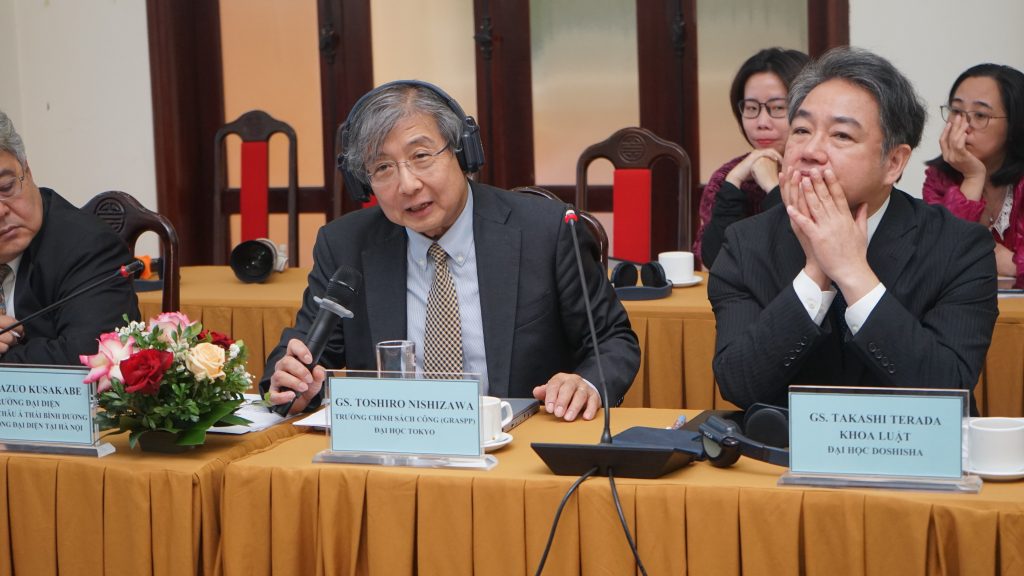
Regarding Prof. Oba’s presentation, Prof. Nishizawa asserted that some considered advancing institutionalization or rule-setting in Asia a prerequisite for a digital economy partnership between Viet Nam and Japan, especially given the current regional order in turmoil. He asked whether Prof. Oba considered the rivalries between great powers, such as the US and China, could affect cooperation and competition for rule-setting in security and economic fields. Responding to Prof. Oba’s views on the roles of middle and small powers in breaking the stalemate, Prof. Nishizawa argued that great power rivalries alone would not determine all rule-setting. He asked Prof. Oba whether cooperation or competition for rule-setting in security and economic fields could be separable or inseparable and whether any new narrative would be available to advance rule-setting using existing institutional frameworks.
Session 2. Digital economy partnership under IPEF: Key contents and implications for Japan-Viet Nam cooperation
Speakers
Prof. Takashi Terada, Doshisha University
Mr. Nguyen Anh Duong, Director, Department for General Economic Issues and Integration Studies, CIEM
Moderator
Prof. Toshiro Nishizawa, Graduate School of Public Policy (GraSPP), The University of Tokyo
Prof. Takashi Terada presented “Narrowing a Divergence of Digital Trade and Data Rules: Indo-Pacific Regional Frameworks and Viet Nam-Japan Cooperation.” He discussed the bilateral cooperation opportunities in the context of Indo-Pacific regional frameworks while highlighting IPEF’s agreements for a clean and fair economy without a consensus on digital trade regulations. In this light, Prof. Terada suggested that Viet Nam could still benefit from the financial support of Japan, Australia, and the US to boost decarbonization and attract Global South economies. He considered that Viet Nam needed to consider whether to take a more open approach to cross-border trade or continue with strict regulations. Prof. Terada mentioned that Viet Nam could benefit from the Data Free Flow with Trust (DFFT) initiative and should consider joining the framework to harmonize digital trade rules. Prof. Terada highlighted the importance of international collaboration in advancing rule-setting using existing institutional frameworks and Viet Nam’s potential to benefit from such initiatives.
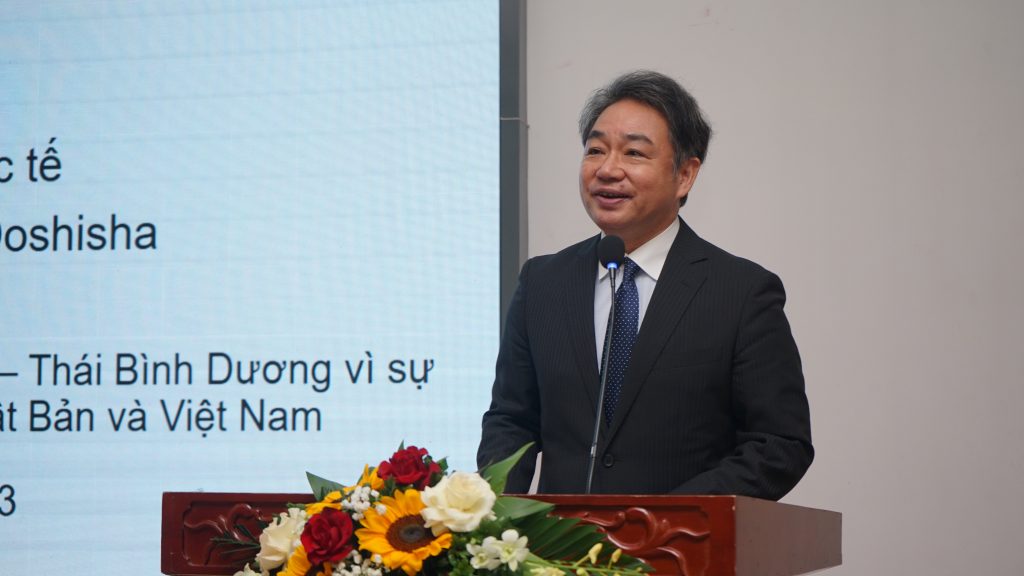
Mr. Nguyen Anh Duong presented “Digital Economy Partnership under IPEF: A Vietnamese Perspective.” Mr. Nguyen discussed the emerging integration trends in Asia-Pacific. He emphasized the increasing attention to fostering economic linkages and free trade agreements (FTAs). He also highlighted some new initiatives and agreements on current digital economy partnerships. Mr. Nguyen continued that digital rules and regulations were expected to play a significant role in shaping the development of industries and national economies, and e-commerce and digital services were increasingly contributing to economic growth. He asserted that, as a result, Viet Nam could promote digital transformation, develop the best practices and regulations for the digital economy, and contribute to setting international rules for the digital economy. At the same time, he listed various challenges facing Viet Nam, such as inadequate digital technology infrastructure, existing legal frameworks unable to support new digital business models, the lack of human resources for the digital economy, inadequate innovative entrepreneurship, and the absence of regulations to protect users. Mr. Nguyen concluded that Viet Nam and Japan should collaborate in sharing best practices and expertise in digital transformation and industry development, rulemaking for the digital economy, upskilling and reskilling of the labor force for digital economy development, and supporting various fora, such as WTO, APEC, and IPEF, on digital economy-related issues.

Panel discussion: Key recommendations for Japan-Viet Nam cooperation to promote digital economy partnership under IPEF
Panelists
Dr. Vo Tri Thanh, President, Brand and Competitiveness Strategy Institute
Prof. Mie Oba, Faculty of Law, Kanagawa University
Prof. Takashi Terada, Faculty of Law, Doshisha University
Prof. Toshiro Nishizawa, GraSPP, The University of Tokyo
Moderator
Mr. Nguyen Anh Duong, Director, Department for General Economic Issues and Integration Studies, CIEM
The panelists addressed questions from the participants and shared additional insights into the goal of IPEF compared with other FTAs and diverse perspectives on promoting digital transformation. Speakers from Japan argued for Viet Nam’s participation in WTO negotiations to develop common digital regulations with Japan and promote digital cooperation. Dr. Vo pointed out the strategic nature of Viet Nam’s commitments in various fora to seek market access in areas where Viet Nam has advantages. He interpreted Viet Nam’s motivation to participate in IPEF as jointly developing the rules of the game, keeping up with new trends in trade, and laying the foundation for Viet Nam’s aspiration for accelerating development to reach high-income status by 2045.
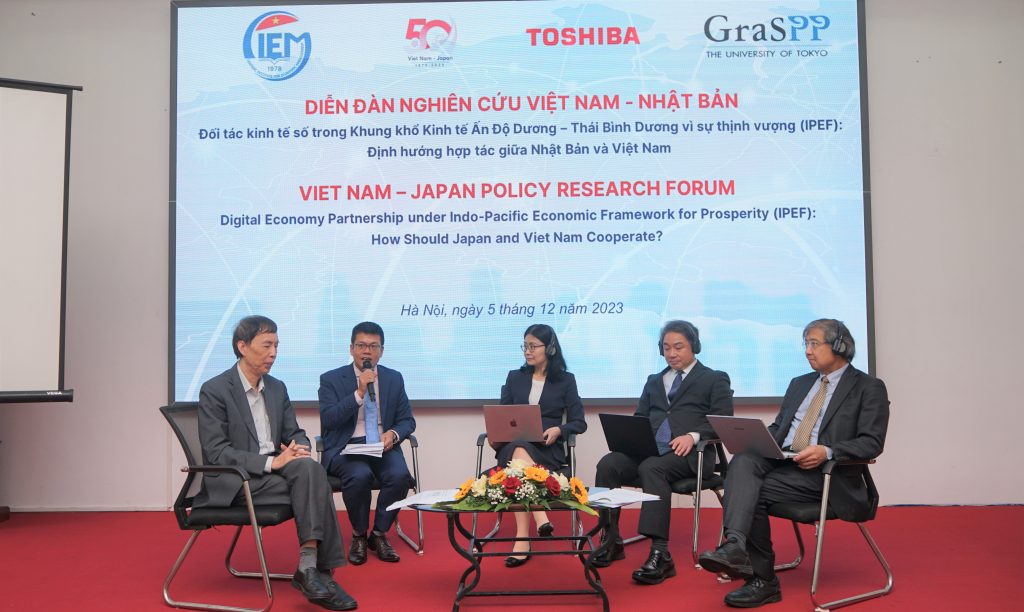
Furthermore, the panelists emphasized the need for close and practical cooperation between Viet Nam and Japan to address these issues effectively. They also agreed that both countries could leverage their strengths and expertise to promote digital transformation and develop common digital regulations, which was expected to result in mutually beneficial outcomes while accelerating Viet Nam’s development.
Concluding remarks
On behalf of CIEM and with the authorization of Dr. Tran Thi Hong Minh, Mr. Nguyen Anh Duong expressed his sincere appreciation for the speakers’ efforts throughout the three sessions. He emphasized that the insights, recommendations, and comments from the discussion would be valuable in shaping the relevant policy notes of CIEM to Vietnamese government agencies. He also thanked TIFO for its continuous and valuable support to CIEM.
Prof. Toshiro Nishizawa joined Mr. Nguyen in commending all the speakers and participants of the Forum and expressed his gratitude for TIFO’s support, without which the Viet Nam-Japan Policy Research Forum would not have been possible.
Prof. Nishizawa and Mr. Nguyen expressed their commitment to deepening cooperation between Viet Nam and Japan. This cooperation could benefit both sides by helping accelerate the growth and development of the digital economy in Viet Nam and promoting mutual understanding and collaboration.
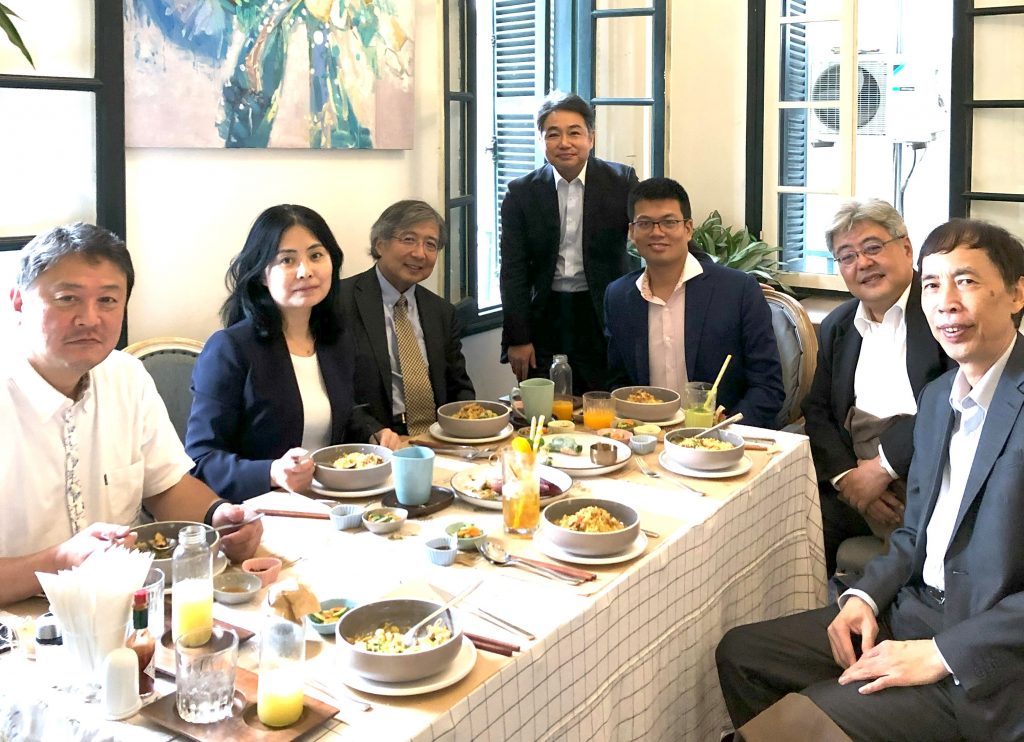
Selected media coverage
https://baomoi.com/viet-nam-nhat-ban-tiem-nang-thuc-day-hop-tac-kinh-te-so-c47726718.epi (in Vietnamese)
https://daibieunhandan.vn/kinh-te-xa-hoi/hop-tac-kinh-te-so-trong-ipef-la-co-hoi-de-viet-nam-hoan-thien-khung-phap-ly-i353039/ (in Vietnamese)
https://thuenhanuoc.vn/tapchi/chuyen-muc/kinh-te-xa-hoi/86ce4628-b018-45e7-9eca-79f2ded81768 (in Vietnamese)
https://bnews.vn/viet-nam-nhat-ban-thuc-day-hop-tac-trong-phat-trien-kinh-te-so/317132.html (in Vietnamese)
https://cand.com.vn/doanh-nghiep/nhat-ban-va-viet-nam-co-nhieu-tiem-nang-de-thuc-day-hop-tac-ve-kinh-te-so-i715998/ (in Vietnamese)
https://Viet Nambiz.vn/ts-vo-tri-thanh-muon-phat-trien-viet-nam-can-tro-thanh-mat-xich-quan-trong-trong-nganh-ban-dan-2023125153552274.htm (in Vietnamese)
About the Forum
Since 2015, GraSPP has been working closely with Viet Nam’s Central Institute for Economic Management (CIEM) under the Ministry of Planning and Investment to enhance intellectual exchange between Japan and Viet Nam, with the financial support of the Toshiba International Foundation (TIFO). The workshop topics since 2015 are shown together with the speakers and moderators from Japan.
February 15, 2023, in Hanoi | “Promoting Japan-Viet Nam Cooperation for Green Growth after the Pandemic” (Prof. Tomonori Sudo, Ritsumeikan Asia Pacific University, Mr. Yoshitomo Kubo, Senior Representative, JICA Viet Nam Office, and Prof. Toshiro Nishizawa, GraSPP)
March 3, 2022 (online) | “New Dynamisms in Asia-Pacific Supply Chains beyond COVID-19: Implications for Japan-Viet Nam Cooperation” (Prof. Fukunari Kimura, Keio University, Prof. Mie Oba, Kanagawa University, and Prof. Toshiro Nishizawa, GraSPP)
March 15, 2021 (online) | “Enhancing Viet Nam–Japan Cooperation for the Sustainable Energy Future in the Greater Mekong Sub-Region” (Prof. Fukunari Kimura, Keio University, Prof. Masahiro Sugiyama, The University of Tokyo’s Institute for Future Initiatives, and Prof. Toshiro Nishizawa, GraSPP)
November 22, 2019, in Hanoi | “How could Viet Nam and Japan Create Mutual Benefit?: Engendering Japan-Viet Nam Industrial Cooperation through Promoting Technology Transfer” (Prof. Kiyohiro Oki, The University of Tokyo’s Graduate School of Economics, Mr. Yasuhiro Yamada, Economic Research Institute for ASEAN and East Asia, and Prof. Toshiro Nishizawa, GraSPP)
November 15, 2018, in Hanoi | “Viet Nam-Japan Policy Research Forum: Deepening Bilateral Cooperation after 10 Years of Viet Nam-Japan Economic Partnership Agreement” (Prof. Mie Oba, Tokyo University of Science, Mr. Yasunori Onishi, Japan International Cooperation Agency, and Prof. Toshiro Nishizawa, GraSPP)
October 27, 2017, in Hanoi | “Exploring New Initiatives for Viet Nam-Japan Cooperation amidst Uncertainties in Asia-Pacific Economic Integration” (Prof. Shujiro Urata, Waseda University, and Prof. Toshiro Nishizawa, GraSPP)
March 2, 2017, in Hanoi | “Enhancing Inclusive Growth in the Context of Regional Integration” (Prof. Fukunari Kimura, Keio University, and Prof. Toshiro Nishizawa, GraSPP)
November 13, 2015, in Hanoi | “Partnership Opportunities for Viet Nam’s Successful Inclusion in ASEAN Economic Community” (Prof. Masahiro Kawai and Prof. Toshiro Nishizawa, GraSPP)


